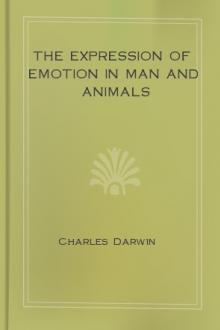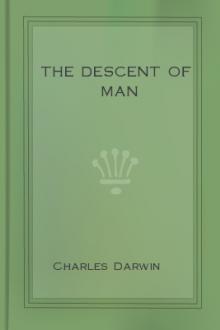author - "Charles Darwin"

to the light, which are so general throughout the vegetable kingdom, and occasionally from the light, or transversely with respect to it, are all modified* See Mr. Vines' excellent discussion ('Arbeiten des Bot. Instituts in Würzburg,' B. II. pp. 142, 143, 1878) on this intricate subject. Hofmeister's observations ('Jahreschrifte des Vereins für Vaterl. Naturkunde in Würtemberg,' 1874, p. 211) on the curious movements of Spirogyra, a plant consisting of a single row of cells, are valuable in

w of progressive development, and as all the forms of life thus tend to progress, in order to account for the existence at the present day of simple productions, he maintains that such forms are now spontaneously generated. (I have taken the date of the first publication of Lamarck from Isidore Geoffroy Saint- Hilaire's ("Hist. Nat. Generale", tom. ii. page 405, 1859) excellent history of opinion on this subject. In this work a full account is given of Buffon's conclusions on the same

Gratiolet appears to overlook inherited habit, and even to some extent habit in the individual; and therefore he fails, as it seems to me, to give the right explanation, or any explanation at all, of many gestures and expressions. As an illustration of what he calls symbolic movements, I will quote his remarks (p. 37), taken from M. Chevreul, on a man playing at billiards. "Si une bille devie legerement de la direction que le joueur pretend zlui imprimer, ne l'avez-vous pas vu cent fois la

that many details of structure in man could not be explained through natural selection, I invented sexual selection; I gave, however, a tolerably clear sketch of this principle in the first edition of the 'Origin of Species,' and I there stated that it was applicable to man. This subject of sexual selection has been treated at full length in the present work, simply because an opportunity was here first afforded me. I have been struck with the likeness of many of the half-favourable criticisms

for I should soon have got over my disgust; and the practice would have been invaluable for all my future work. This has been an irremediable evil, as well as my incapacity to draw. I also attended regularly the clinical wards in the hospital. Some of the cases distressed me a good deal, and I still have vivid pictures before me of some of them; but I was not so foolish as to allow this to lessen my attendance. I cannot understand why this part of my medical course did not interest me in a

. Nor have I been disappointed; in this and in all other perplexing cases I have invariably found that our knowledge, imperfect though it be, of variation under domestication, afforded the best and safest clue. I may venture to express my conviction of the high value of such studies, although they have been very commonly neglected by naturalists.From these considerations, I shall devote the first chapter of this Abstract to Variation under Domestication. We shall thus see that a large amount of

Description The Origin of Species by Charles Darwin must rank as one of the most influential and consequential books ever published, initiating scientific, social and religious ferment ever since its first publication in 1859. Its full title is The Origin of Species by Means of Natural Selection, or the Preservation of Favoured Races in the Struggle for Life, in some editions prefaced by the word “On.” Darwin describes the book as simply an “abstract” of his ideas, which are more fully fleshed

to the light, which are so general throughout the vegetable kingdom, and occasionally from the light, or transversely with respect to it, are all modified* See Mr. Vines' excellent discussion ('Arbeiten des Bot. Instituts in Würzburg,' B. II. pp. 142, 143, 1878) on this intricate subject. Hofmeister's observations ('Jahreschrifte des Vereins für Vaterl. Naturkunde in Würtemberg,' 1874, p. 211) on the curious movements of Spirogyra, a plant consisting of a single row of cells, are valuable in

w of progressive development, and as all the forms of life thus tend to progress, in order to account for the existence at the present day of simple productions, he maintains that such forms are now spontaneously generated. (I have taken the date of the first publication of Lamarck from Isidore Geoffroy Saint- Hilaire's ("Hist. Nat. Generale", tom. ii. page 405, 1859) excellent history of opinion on this subject. In this work a full account is given of Buffon's conclusions on the same

Gratiolet appears to overlook inherited habit, and even to some extent habit in the individual; and therefore he fails, as it seems to me, to give the right explanation, or any explanation at all, of many gestures and expressions. As an illustration of what he calls symbolic movements, I will quote his remarks (p. 37), taken from M. Chevreul, on a man playing at billiards. "Si une bille devie legerement de la direction que le joueur pretend zlui imprimer, ne l'avez-vous pas vu cent fois la

that many details of structure in man could not be explained through natural selection, I invented sexual selection; I gave, however, a tolerably clear sketch of this principle in the first edition of the 'Origin of Species,' and I there stated that it was applicable to man. This subject of sexual selection has been treated at full length in the present work, simply because an opportunity was here first afforded me. I have been struck with the likeness of many of the half-favourable criticisms

for I should soon have got over my disgust; and the practice would have been invaluable for all my future work. This has been an irremediable evil, as well as my incapacity to draw. I also attended regularly the clinical wards in the hospital. Some of the cases distressed me a good deal, and I still have vivid pictures before me of some of them; but I was not so foolish as to allow this to lessen my attendance. I cannot understand why this part of my medical course did not interest me in a

. Nor have I been disappointed; in this and in all other perplexing cases I have invariably found that our knowledge, imperfect though it be, of variation under domestication, afforded the best and safest clue. I may venture to express my conviction of the high value of such studies, although they have been very commonly neglected by naturalists.From these considerations, I shall devote the first chapter of this Abstract to Variation under Domestication. We shall thus see that a large amount of

Description The Origin of Species by Charles Darwin must rank as one of the most influential and consequential books ever published, initiating scientific, social and religious ferment ever since its first publication in 1859. Its full title is The Origin of Species by Means of Natural Selection, or the Preservation of Favoured Races in the Struggle for Life, in some editions prefaced by the word “On.” Darwin describes the book as simply an “abstract” of his ideas, which are more fully fleshed
